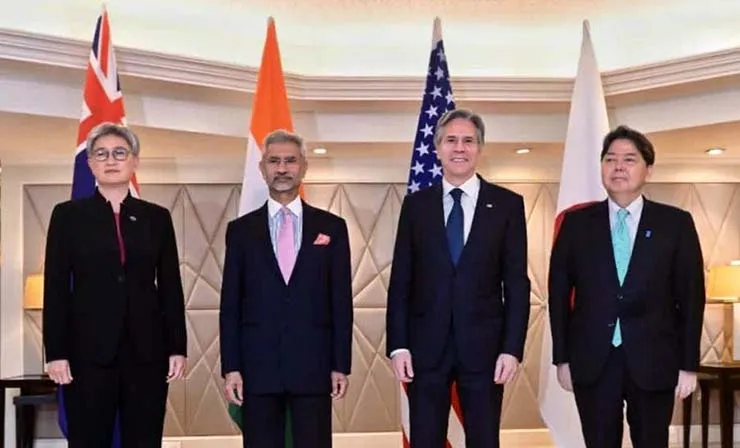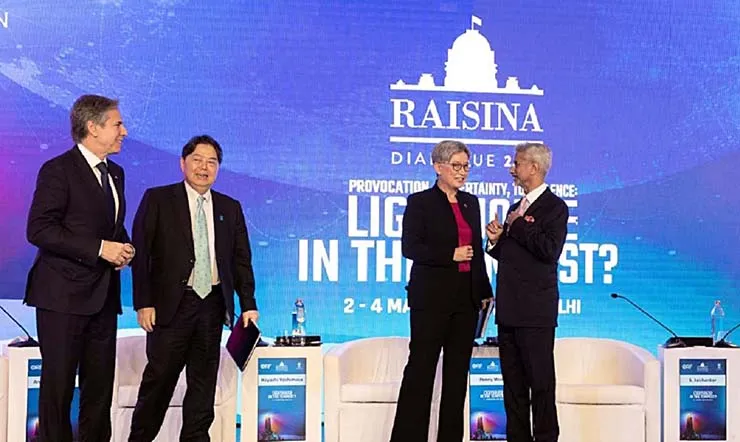
In the first week of March, India was a host to several activities–ranging from the G20 foreign ministers’ meet to the Quad ministerial engagement to the Raisina Dialogue, creating an opportunity for the country to discuss and debate impacts of Russia-Ukraine war, economic slowdown, China’s aggressive designs in the Indo-Pacific region and deleterious effects of climate change.
In the midst of these activities, India also held a conference of security officials of 26 countries and discussed the Ukraine war, ISIS threat and China’s activities in the Taiwan Strait, South China Sea and East China Sea.
Attended by intelligence representatives from the UK, France, Germany and other countries, the conference, held ahead of the G20 foreign ministers’ meet, also saw issues like terrorism, narco-terrorism, money laundering, human trafficking being discussed in detail.
The Ukraine war and China’s militaristic activities in the Indo-Pacific region served as the common thread of the deliberations across the security conference, G20 foreign ministers’ meet and Quad ministerial conclave. Russia’s continued war against Ukraine for the past one year and Moscow’s growing dependence on China for all essential goods, including non-lethal equipment came for discussions during the G20 Foreign Ministers’ gathering, but due to opposition from Moscow and Beijing, no joint statement could be issued. Both were opposed to the wording in reference to the Ukraine war.
For this, India was not at all surprised at the outcome of the G20 Foreign Ministers’ meeting where representatives of more than 50 countries and international organisations, including US Secretary of State Antony Blinken, Russian Foreign Minister Sergey Lavrov and Chinese Foreign Minister Qin Gang attended the meet, considered to be the largest gathering of foreign ministers in the G20 history.
Foreign Ministers of Japan and South Korea could not attend the meeting due to their domestic compulsions; instead, these two were represented by their vice ministers. In total, there were the presence of Foreign Ministers of 27 countries, apart from India and two vice ministers, representatives from nine guest countries and 13 international organisations.

On its part, India tried its best to negotiate through differences between the US-led Western bloc and Russia and China over the Ukraine war. Indian diplomats had, in fact, worked overtime for the past several months to ensure that the tension between the two sides did not come in the way of New Delhi’s agenda for mitigating the sufferings of people in the global south.
Though it did materialise and for this, India’s External Affairs Minister S Jaishankar and officials of the Ministry of External Affairs could be given due credit as they managed to get G20 Foreign Ministers agree to deliberate on food and energy crisis, climate change, counter terrorism, counter narcotics, ambitious climate and environmental action and global health, but these issues could have been part of a joint statement rather than becoming a part of chair’s summary and outcome document. Remember chair’s summary does not carry much diplomatic weight even as it presents issues that have been duly endorsed verbally by participants.
At the G-20 Foreign Ministers’ meeting focus was also laid on strengthening of multilateralism, creation of global talent pool, humanitarian assistance, uneven pandemic recovery, growing poverty and inequality, geopolitical tension, and conflict, rising prices of food, fuel, and fertilisers, gender equality and women empowerment. But they are not new issues. They have been discussed at the earlier G20 Foreign Ministers and G20 summit also.
On the contrary, issues like counter narcotics and global mapping skills were new issues and needed thorough discussions but due to division of participants in camps—one led by the US and other by Russia and China, they were discussed without adding any worthwhile dimension to deliberations on these topics.
However, in order to project that the G20 Foreign Ministers’ meet was not a complete wash out development, EAM Jaishankar said: “For the first time, the G20 Foreign Ministers considered and discussed the topic of counter narcotics and called for inclusive and strong international cooperation in this regard. They also discussed the topic of global skills mapping and this was in the context of the changing nature of work. They recognized that well-integrated skilled workers benefit not only in their country of origin, but also the destination country where they may happen to be employed.”
Overall picture at the G20 Foreign Ministers’ meet remained chequered with Russia being totally against the use of the word ‘war’ in respect to its invasion on Ukraine; while China was not agreed to its role in debt distress. Russian Foreign Minister Sergey Lavrov was not happy with the lifting of sentences from the Bali Declaration which was agreed to by all members except Moscow and Beijing. It read: “War in Ukraine has further adversely impacted the global economy…..Most members strongly condemned the war in Ukraine and stressed it is causing immense human suffering and exacerbating existing fragilities in the global economy—constraining growth, increasing inflation, disrupting supply chains, heightening energy and food insecurity, and elevating financial stability risks.”
In fact, the similar situation had emerged at the G20 Finance Ministers and the Central Bank Governors’ meeting in Bengaluru. No joint communique was issued due to sharp differences between the Western bloc and Russia-China combine over the Ukraine war.
Yet the G20 Foreign Ministers’ meeting in New Delhi created an opportunity for S Jaishankar to hold a meeting with Chinese Foreign Minister Qin Gang where they discussed challenges in their bilateral relationship. “Our discussions were focused on addressing current challenges to the bilateral relationship, especially peace and tranquillity in the border areas,” Jaishankar tweeted after his meeting with Qin Gang who had arrived in India for the first time after becoming Foreign Minister of China, replacing Wang Yi. The meet also offered US Secretary of State Antony Blinken to hold a bilateral meeting with Russian Foreign Minister Sergey Lavrov, first time since the Ukraine war.
Yet so much has changed in the world due to the Ukraine war that there is fear the G20 summit to be held in September in New Delhi may witness an emergence of the same pattern with Russia and China in all likelihood throwing a spanner in India’s bid to make the summit successful. Despite this, India seems to be geared up to face challenges at strategic and diplomatic level. Recent developments in the Indo-Pacific region were discussed at the Quad Foreign Ministers’ meet, held on the sidelines of G20 Foreign Ministers’ conclave in New Delhi.

In their joint statement issued after the meeting, Quad Foreign Ministers supported the principles of freedom, rule of law, sovereignty and territorial integrity, peaceful settlement of disputes without resorting to threat or use of force and freedom of navigation and overflight, and oppose any unilateral attempt to change the status quo, all of which are essential to peace, stability, and prosperity of the Indo-Pacific region and beyond.
It was a veiled criticism of China, which has alarmed neighbours like Vietnam, Philippines, Indonesia, Malaysia, and Brunei by pushing claims to the disputed South China Sea. “We concur that the rules-based international order is anchored in international law, including the UN Charter, and the principles of sovereignty, political independence, and territorial integrity of all states,” the Quad Foreign Ministers’ joint statement said. Riled by this, China’s Foreign Ministry Spokesperson Mao Ning said, “We hope certain countries can do more things that contribute to security and mutual trust between regional countries and that help to maintain regional peace and stability.”
Russia joined China in condemning Quad with Foreign Minister Sergey Lavrov maintaining what Beijing has been stating against India, US, Japan, and Australia-led bloc for years. Lavrov accused the US of “trying to militarize Quad.” It is what confirms the international fear of weak Russia riding piggyback on China on all issues of regional and global dimensions.
Strategically, for India too, it is not a good sign as Beijing, which shares itchy relations with New Delhi, may draw Moscow to support its unilateral action in the South China Sea and South Asia. However, Congress MP and former international civil servant Shashi Tharoor seems to be more brash about the implications of Russia’s dependence on China. Speaking at the Raisina Dialogue, he said, “A Russia that looks more like a junior partner of China will be less useful for India.”
Only in the coming days, it could be assessed how strongly the Russia-China tango has impacted global politics in military and strategic terms. There is a common understanding among diplomats and experts across the world that Russia, in its bid to resist the West’s attempt to isolate it, will ultimately capitulate to China’s all big and small demands in order to secure Beijing’s economic, diplomatic, strategic and military support.
–The writer is a senior journalist with wide experience in covering international affairs. The views expressed are of the writer and do not necessarily reflect the views of Raksha Anirveda








